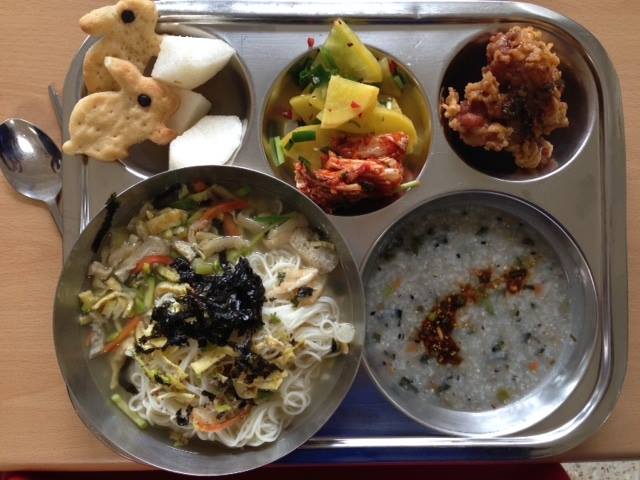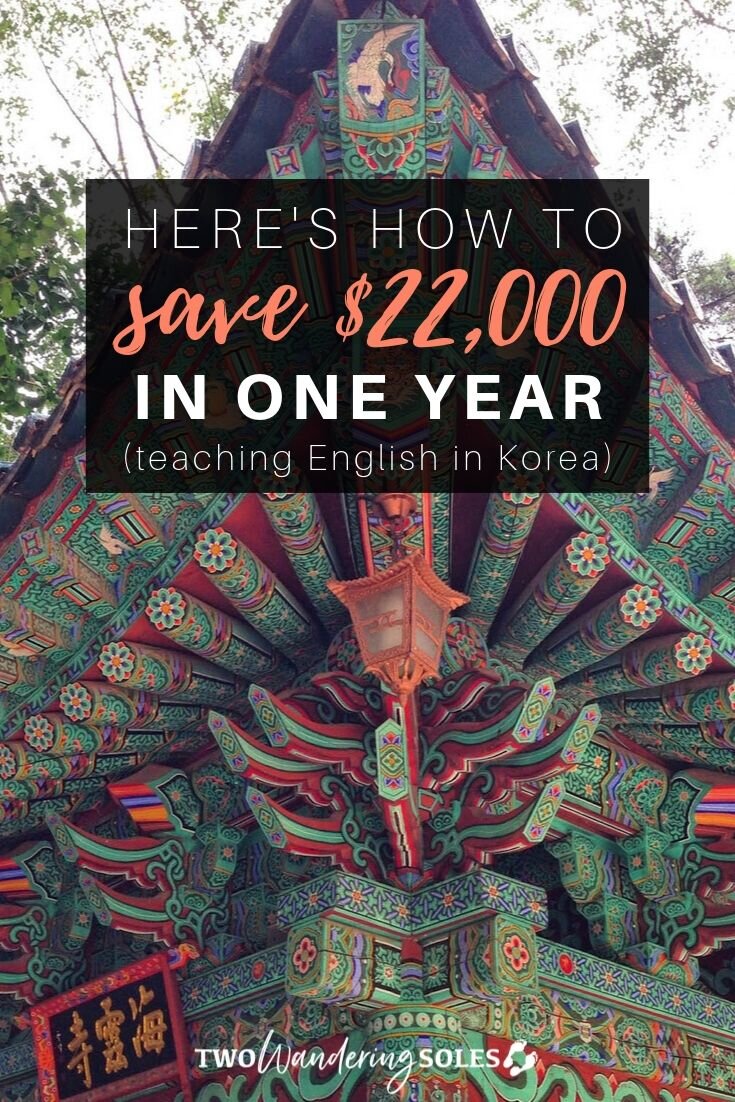
Yes, you read that number right. And yes, that is how much we saved PER PERSON. I’ll spell it out one more time to avoid any confusion. We saved $22,000 US dollars EACH during one year of teaching in Korea… Just over $44,000 between the two of us. And we could have saved more if we traveled less and didn’t eat so much. But hey, no regrets here!
If you’re considering teaching English in Korea, you already know the money is good. The promise of a free plane ticket and rent-free apartment are benefits enough to move across the world. Add to that a decent salary and a relatively low cost of living, and you have a surefire way to save a ton of money, right? Wrong.
If you come to Korea expecting to double your bank account but have no real budgeting plan, you won’t save any money. We watched many people arrive in Korea with dollar signs in their eyes, but halfway through the year they looked at their bank account only to realize they had saved hardly any money.
But we’ve also had friends completely pay off their debt, or save up enough money to travel long-term. And we are pretty proud of the little “nest” we built in just one year that’s allowing us to travel the world and pay off student loans.

PLEASE READ: We are not sharing this information to be boastful, but instead to answer the many questions we have received about how we afford to travel. Additionally, we hope this information is helpful to others who choose to be a teacher in a Korean classroom with the goal of earning money along the way. We believe that with discipline, anyone can reach their saving goals.
So how did we do it? How can you save $22,000 teaching in Korea too? Keep reading for a breakdown of just how much life in Korea will cost you, and how much you should expect to save. Then read on for some exclusive tips that helped us save money in South Korea, and we’ll even reward you with a FREE DOWNLOAD of the exact same spreadsheet that helped us stick to our budget.
Are you ready? Okay, here we go…
How much will you earn teaching English in Korea?
We’ve had countless emails and Facebook messages from old friends and new readers all wondering the same thing… How can we afford to travel? We have lots of tips we’ll be sharing soon, but one of the biggest ways we were able to save money was by teaching in South Korea. So how much, exactly, did we earn? And how much were we able to save?
Drumroll, please… Here come the numbers everyone is excited about. We have them all broken them down for you.
(Please note: All figures are for ONE PERSON during ONE YEAR as an EPIK English teacher.)
Salary: 2,400,000 won per month ($2,143 USD*)
Your English teacher salary, as with many things in Korea, depends on many things. EPIK salaries start at 2,000,000 won per month, but many English teachers take home more. Your salary can be influenced by factors such as: previous teaching experience, level of degree in university, number of schools you teach at and location of your placement.
Furthermore, teachers will receive a raise in salary for each year they renew their contract. So if you plan to stay in Korea a while, you can really roll in the dough!
I had two years of previous teaching experience, and Ben taught at more than one school plus he has his Master’s degree, so each of us earned more than the starting salary.
*The salary listed above is the average of both Ben’s and my salaries. Depending on your qualifications, your salary may be slightly higher or lower.
Further breakdown:
Previous Teaching Experience: If you have 2 or more years teaching experience, your starting salary will be 2,500,000 won per month. Note that you will need written proof, and your experience will need to meet certain requirements.
Multiple Schools: Most of the EPIK English teachers we know taught at more than one school. While this may seem overwhelming at first, it is actually a good thing! That’s right, you’ll earn an additional 100,000 won (about $89 USD*) per month. And if you are at more than 2 schools, you’ll rack up 150,000 won each month.
Rural Placement: If you are placed in a rural region, you will receive a stipend of 100,000 won per month. This is often necessary, as travel from the more remote towns can add up.

Update: Teaching during the day is not the only thing you can do to make money. One super easy way Ben has recently found is to teach English in an online classroom with VIPKID.
You can earn anywhere between $16-$22 per hour (plus additional incentives) practicing English elementary-age students in China. You can set your own schedule (best hours are Beijing evening time), work as many hours as you want and you don’t even need to your TEFL to do it.
All you really have to do is be on time, be energetic and be happy, which many of you already are. Check out it VIPKID here, it will be the easiest money you make online.
Entry Allowance: 1-time payment of 300,000 won ($268 USD*)
This is kind of a “get you started” bonus that you’ll receive as soon as you get to your city.
Tip: It might be tempting to spend it all at once furnishing your apartment with cute coffee mugs and throw pillows, but try to only get the essentials – a few pots and pans, toilet paper, and all that fun stuff – and pocket the rest. If you’re lucky, the previous teacher will have left some items behind, so take advantage of that.
Take a look at our South Korea packing list so that you are prepared when you arrive and don’t have to purchase too much to get on your feet.
Flight Allowance To and From Korea: Two 1-time payments of 1,300,000 won = 2,600,000 won total ($2,321 USD*)
Your school pays for your way to and from Korea. Your entry flight allowance will be paid to you in your first month’s pay, and your exit flight allowance will be given to you on your last month’s pay.
Tip: Stalk your flights and get the cheapest one possible. Your school will give you the same amount regardless of how much you pay for your flight. For example, our return flights to the US were just $430 (we booked our August flights in January), but we still received nearly $1,160 USD from our schools.
Severance: 1-time payment of 2,400,000 won or equivalent of 1-month’s salary ($2,143 USD*)
If you successfully complete your 1-year contract, you will be given an additional month’s salary. So it’s like 13 months of pay for 12 months of work. Wahoo!
Pension: 1-time payment of 2,600,000 won ($2,321 USD*)
A portion of your monthly salary is deposited into the Korean National Pension system, and the government will match what you put in. You’ll receive this money about one month after you complete your contract.
Note: Unfortunately, South African citizens are not eligible for this payment as this time.
Extra Income
There are chances for you to earn extra income during the year if you choose. We only took advantage of a couple such opportunities, but certainly could have found more.
Note: The following payments are for one person.
Weekend English Camps: 1-time payment of 800,000 won ($714 USD*)
Every year there are opportunities to do weekend, winter, or summer English camps. Ask your school or get in contact with you regional EPIK coordinator and request to be considered these extra money-making gigs.

EPIK Life Video Contest Winner: 1-time payment of 500,000 won ($446 USD*)
Each year, EPIK holds a competition for videos that showcase what life is like teaching in Korea. I submitted my video, and guess what?! I was selected as the grand prize winner! The reward? A cool 500,000 won. Try out your video editing skills, even if you are a novice like me… you might just surprise yourself! And keep a lookout for other contests hosted by EPIK throughout the year.
Total Income: 38,000,000 won ($33,929 USD*)
This number is the total earnings of our English teacher salary, entry allowance, flight allowances, severance and pension, as well as some additional money we earned.
*All conversions use the average rate of 1,120 won = $1 USD (throughout August 2014 to August 2015)

FREE E-BOOK ON WHAT IT’S REALLY LIKE TEACHING ENGLISH
If you’re considering teaching overseas, you MUST read this. Most bloggers and TEFL providers don’t like talk about these 13 things, because they’re not fun to hear.
But taking the leap to teach abroad is a big, life-altering decision, and we think it’s important to know exactly what you’re getting into. The good, the bad, the UGLY. All of it.
How much will life in Korea cost?
Okay, now that you know how much each of us earned over the course of the year, let’s talk expenses. How much did we spend exactly? Well lucky for you, we kept track of every single won!
(All expenses below are monthly averages for ONE PERSON)
Housing: 0 won per month ($0 USD*)
One of the biggest perks about teaching in Korea is that your school will pay your housing cost! See what a typical home looks like in a video tour of our Korean apartment.
Internet: 0 won per month ($0 USD*)
Internet is also typically provided by your school.
Bills: Electric, Gas, Phone, and School Lunches – 143,000 won per month ($128 USD*)
Electric and gas: This cost will vary per month depending on how you use A/C, ondol floor heating (which we barely touched because it took 4 hours to heat our apartment), and your stove.
We generally paid more in the hot summer months because we used our air conditioning. Gas and electric fluxuated from 20,000 won to 80,000 won, but the average was about 40,000 won per month ($36 USD*).
Phone: We both had phone plans through Olleh that each cost 38,000 won per month ($34 USD*).
Tip #1: We rarely used minutes on our phone, and would have preferred to have a cheaper plan that had fewer minutes. We learned that once you sign a contract it is very difficult to change until the contract’s end date.
Tip #2: DO NOT sign up for a phone contract through The Arrival Store. Their plans are much more expensive than you will find elsewhere. Our advice is to wait until you move to your assigned city and go with your co-teacher to find a plan that works for you. And yes, you will be just fine without data during orientation!
Lunch: You will pay for lunches at school that you eat right alongside your students and co-teachers. Each school charges a different price and there’s not any negotiation. Unless you are a vegetarian, we highly recommend eating your school’s lunch. It can be seen as disrespectful if you opt out. Plus, it’s much simpler than preparing your own lunch every day and is a way to try different Korean foods.
The cost varied depending on the number of school days in the month, but the average cost was about 65,000 won per month ($58 USD*).

Food: 175,000 won per month ($156 USD*)
We cooked many of our own meals at home and sometimes went out to eat with friends.
Tip: To save money and time, we typically bought produce at a local supermarket and cooked one big meal on Sunday night. It usually lasted until the weekend when we often times ate out with friends.
Transportation: 40,000 won per month ($36 USD*)
Korea is fairly cheap to travel around. This category includes local bus and metro fees, taxis, and short trips to neighboring cities.
Tip: Avoid taxis as much as possible, and get to know your town’s bus route instead. Many cities in Korea have a phone app with a map and timetables. The city bus may take a bit longer, but is far less expensive.
Entertainment: 95,000 won per month ($85 USD*)
Living in Korea is tons of fun! We bundled entrance fees, movie tickets, fancy dinners, coffee dates, bingsu cravings, karaoke, nights out at bars, and any alcohol purchases into our entertainments expenses.
Tip: Tons of coffee shops line just about every street in Korea, and it’s tempting to go several times a week. Try to limit yourself or brew your coffee at home, because a cup o’ joe is not cheap in this country.
Travel within Korea: 170,000 won per month ($152 USD*)
We traveled a ton. We actually went through our calendar as found that we traveled 67% of the weekends we lived in Korea. That’s 35 weekends! (Yeah, Ben is an Excel nerd!) From bare-hand fishing in Pyeong Chang, exploring sunny Busan, nights out in Seoul, and reveling in the island beauty of Jeju, we saw a lot of the country.

Travel Outside of Korea: total of 3,472,000 won ($3,100 USD*)
While living in Korea, we visited 3 other countries. We traveled on a budget, though we had some vacation splurges here and there. You can check out the detailed budget breakdowns for each of our trips to the Philippines, Japan, and Indonesia.
Note: International flights to these destinations are included in this category and totaled $1,094 USD.
Miscellaneous: 50,000 won per month ($45 USD*)
There will always be those expenses that you just can’t plan for, such as random school activity fees or a co-worker’s wedding gift. We also had some purchases that don’t fit into any other category like clothes, home supplies and presents.
Flights to and from Korea: 1-time payment of 1,545,600 won ($1380 USD*)
Our flights TO Korea (in August) were $950 USD, and our flights BACK HOME to the US (in August) were $430 USD.
Note: If you are going through EPIK, you likely won’t have much time to research flights before purchasing, and like us, you’ll end up paying a little more than you should. The $1,300 flight allowance is generous though, and hopefully your ticket will be less than that.
For your return flight, start researching 10 months before you plan on leaving for the best deals. In January, we found a flight from Seoul to Minneapolis for $430 total which we just couldn’t pass up!
Student Loans: $0…sorta…
What about student loans? Maybe you’re lucky and don’t have any debt from attending university (in which case, I’m super jealous!). But if you’re like us, and have lots of student loans to pay, don’t forget to include your monthly payment in your budget.
We worked really hard to save enough money at our jobs back at home to cover our loan payments for the entire year. That is why our loan payments are not included in this calculation.
Total Expenses for the Year: 13,093,600 won ($11,691 USD*)
This number includes monthly bills, food, transportation, entertainment, travel within Korea, travel outside of Korea, miscellaneous cost and flights to and from Korea.
Bottom Line:
Total Profit for the Year (38,000,000 won) minus Total Expenses (13,093,600 won) = 24,906,400 won… that’s equivalent to roughly $22,238 USD PER PERSON!!!
*All conversions use the average rate of 1,120 won = $1 USD (throughout August 2014 to August 2015)
READ MORE: Now that you have all the numbers, continue reading for some exclusive tips and tricks that helped us save $22,000 in one year!
We will even reward you with a FREE DOWNLOAD of the exact same budget spreadsheet we used to keep track of our budget! All you have to do is sign up with your email and we will personally send you our budget spreadsheet.
Are you interested in teaching English abroad
Teaching English in South Korea was one of the best decisions we’ve ever made. Be sure to check out our Teaching English Abroad homepage for resources on everything you need to know from how to get started to moving abroad. Or you can read some of our favorite articles about teaching English below.
- TEFL Certification: The Complete Guide to Teaching English Abroad
- How to Save $22,000 in One Year Teaching English in South Korea
- Things I Wish I Would Have Known About Teaching English With EPIK
- 11 Reasons Why You Should Teach English Abroad
If you’re planning a trip to South Korea, be sure to check out our Ultimate Guide to South Korea for answers to all of your most burning questions!
Save this article on Pinterest for later!


We want to hear from you!
Do you have any more questions about how much you can save, or budgeting while teaching English in South Korea? Leave you comment below and we’ll do our best to get back to you!

FYI…China seems to have surpassed South Korea in pay, with similar expenses benefits. This year, an ESL teacher with experience and proper degrees and certifications can find jobs ranging $2500-$3000 per month. You might want to consider coming to China. Many similarities between the two countries.
Thanks for the tip BG. I would never trade my experience in Korea for anything. It was an amazing time and pay is not always the most important thing when living in a new country. But if it is, there are plenty of opportunities in Korea that pay $2500-$3000 if you have a right certs and degrees.
Some of my friends learned korean with korean teacher at https://preply.com/en/skype/hebrew-tutors. They told that it’s a great possibility to study online. What can you say about this platform? I want to learn korean too so now I’m looking for different ways to study it.
Hi James, I have not personally tried that site. Let me know how it goes! There are many ways to learn Korean. One way that helped me was searching on youtube. There are some really good videos out there.
This sounds like a great opportunity to save while still getting a travel experience! I have been thinking about teaching English somewhere in Asia or South America, but I do wonder if there any jobs for non-native speakers. I’m Dutch and have been living in London for nearly 5 years now (after having learned English in school for 10 years), so English comes very natural to me. How do you think this is looked upon?
Hi Rianna, teaching English is a fantastic experience and I bet you’d be great! There certainly are positions for non-native speakers.
Unfortunately, the government-run program we did in South Korea (EPIK) only accepts native English speakers from certain countries (USA, UK, Canada, Ireland, Australia, New Zealand, South Africa). Private schools work a little differently and have more flexibility with who they accept – and some are open to non-native speakers. I’d recommend going to Dave’s ESL Cafe ( a super helpful forum for ESL jobs) and asking if any non-native teachers will be leaving their position and need someone to fill it.
I assume this is the same case in China, Japan and South America, but I’m not sure. Dave’s ESL Cafe will be a great place to start looking. Best of luck!
Hello. I’m curious about what kinds of meals you made and how you kept your food costs so low. I am currently living in Daegu and every time I go grocery shopping everything feels quite expensive and I end up spending a lot. I’m still trying to work out a good system.
Hi Daniela, great question – it took us a little while to get it down too.
We typically cooked vegetarian meals because a) we like eating tons of veggies b) it’s healthy c) it’s cheap! Occasionally, we’d get chicken and cook that and add it to our meals, but usually, we didn’t cook with any meat. (We got plenty of meat in our school lunches and whenever we’d go out to eat.)
Staple meals for us were zucchini pasta*, stir fry, lettuce wraps, veggie soups, curries, etc. We tried to make meals that were both healthy and cheap.
We also typically meal prepped for the entire week on Sunday so that we had all of our dinners made. That helped us stick to a budget and avoid eating out because we “didn’t feel like cooking”.
Also, we tried to get all our produce at a local supermarket because it was much cheaper than HomePlus. We compared prices at all the grocery stores around us so we knew which was the cheapest and had the freshest produce – it took us a few weeks to find a place that had we loved. We still went to HomePlus for staples, International foods, toiletries, wine (only the 5,000 won stuff lol), and when we couldn’t be bothered to go to our local place haha.
It might go without being said, but we really tried to only buy things that were in season, and avoided notoriously expensive items in Korea (like avocados) – or saved them for special occasions only.
Also, living in a suburb of Gumi might have meant we have a tad lower prices than in certain areas of Daegu.
I hope this helps give you some ideas!
Thank you so much for writing this article. My boyfriend and I are going to be teaching in Gwangju in June.
You are very welcome Sarah! Gwangju is an amazing city, you’ll have so much fun. Let us know if you have any questions!
Thank you for this article. My girl is an English teacher, she is enrolled in a Master Degree right now. I will recommend this article to her.
Thanks so much for recommending this, Gustavo. That’s very kind of you!
Hey, I’m so glad I found your blog. I have a few questions that you might know the answers to:
1) I’m 20 years old, I plan to go to Korea to teach English, I am TEFL certified, however, I did not go to college to get a degree (I learned by doing stuff).
2) How much would I save per year if I was tight with money – considering my situation.
Regards,
Ryan H
Thanks in advance!!! 🙂
Hey Ryan, I’m glad it’s been helpful! That is a great question. There are many fantastic English teachers we met who also did not have a college degree. Unfortunately, opportunities are a bit more limited. Many people want to move to Korea to teach English, so EPIK (the public school system) does require that all candidates have a college degree. They used to have a program called TALK that was open to people without degrees and I believe you could also do a shorter contract if you wanted. I think the last I heard, they were cutting back on this program and I’m not sure how many people they are accepting now. I think your best bet would be to look for a Hagwon job. These are privately owned schools, so they can be more lenient with qualifications and may have different requirements altogether. Try searching for a position on Dave’s ESL Cafe website and asking around in the forum if anyone knows of any openings. If you can be flexible with your start date and you’re not picky about your placement city, you might even find a position that pays the same as those schools who only hire college graduates.
Best of luck!
Hi, guys!
I’m going to Daegu, South Korea in February and have been so thrilled to have found your blog! It’s been so helpful! Thank you so much!
I wanted to know if you ever joined the gym while you were there. Do you have any idea what the prices for those sort of recreational activities were?
Thanks again!
Hey Angie! I’m so glad you’ve found it helpful. You’re going to love it! We didn’t actually join a gym while we were there – we worked out at home or went running in the warmer months. There are plenty of gyms though, and you won’t have a problem finding one in Daegu.
They are a little different from gyms in the US – some of them provide scrub-like uniforms 😉 I think depending on the type of gym and what kind of contract you sign, they start at around 50,000 won per month (around $50 USD). A friend of ours who lives in Daegu pays 60,000 won per month for her membership, which isn’t bad on an English teacher’s salary.
If you want to join a more specified gym with yoga or Crossfit, for example, and are in a prime location, I think it can be quite a bit more.
Best of luck with your move, and let us know how you like life in Korea!
Hi there! I’m glad I stumbled upon this blog when I was looking for stuff to do in Tokyo (one of your listicles). Pleasantly surprised to see all the other useful posts you have here. Thank you so much for sharing all this information, very useful for planning my trip next week! 🙂
I’ve been meaning to join the JET/ILA programme in Japan, but I don’t think I fit the criteria they’re looking for… although my background is in TESOL and I grew up bilingual (in English and my native tongue, Malay), from what I’ve read, they’re looking for people from ‘inner circle’ countries and those who went to primary-secondary schools where English is the medium of instruction (both of which do not apply to me). This blog post made me wonder if EPIK has a similar criteria; that my ethnicity/nationality/educational background may affect my chances to get a spot if I were to apply. Do you think this is a realistic concern?
Anyhow, you mentioned that Ben is an ‘Excel nerd’… what kinds of spreadsheets does he make? I’m just starting to learn more about Excel, would be nice to see how other people use it. 🙂
Cheers!
Hey Zaty, I’m so glad you found us!
Your concerns about the JET program are valid for so many people who don’t come from a certain group of countries. I understand your frustration, and would feel exactly the same in your place. Growing up with your bilingual background would make you an excellent teacher. Unfortunately, EPIK’s requirements are very similar to JET. Applicants must be from Canada, the U.S., the U.K., Australia, New Zealand, or South Africa (newly added to the list).
The good news is that your nationality doesn’t mean that you can’t teach English in Korea. I did know several teachers from countries other than these (Russia, Singapore, Malaysia, the Netherlands, etc.) when we were living in Korea. Although the government-run program (EPIK) does not accept applicants from these countries, hagwons (or privately-owned schools) have less strict regulations on your home country as long as your English is excellent (which I can tell from your writing it is!). Hagwons are well-paid and sometimes even have more benefits than the public school system for teachers, but they vary in quality. I assume there are similar schools in Japan as well. If you have any questions, feel free to reach out again!
And that’s awesome you’re learning more about Excel. Ben uses it for many things – from making budgets to figuring the optimal amount to pay each month on our student loans (to reduce interest) – I am amazed what that program can do! I’ll be sure to send the budget spreadsheet to your email 🙂
Best of luck, Zaty. Hope to keep in touch 🙂
Not just a well put together but also really informative – really great post! Having myself saved about two third’s of your amount I thought I did insanely well. And then I found this article haha! I love sharing with people how much they can save in the ROK if the make it a priority.
Hey Josh, thanks for the nice comment! It is so surprising to most people when they hear how much we were able to save! And the crazy part is that we never felt like we were missing out on anything we wanted to do in order to save money. In fact, we did more traveling in Korea and around Asia than we expected to.
Teaching in Korea is something I recommend to almost any recent college grad (or people who are just looking for a job change) and want to earn $$ to pay off student loans, etc. And in addition to saving money, it is such an amazing place to live overseas (as I’m sure you’ve found as well!).
Cheers!
Hi Katie
Before I begin I need to thank you. Your articles are incredibly informative.
Anyways, I will be leaving to Daegu in the next 2 weeks to begin my Esl adventure. Saving money is really important because I want to go to culinary school when I come back. I noticed you mentioned the English camps as a great way to earn extra cash. Do they allow teachers at Hagwons to work at these camps or are they restricted to to EPIK teachers only?
Thank you again for writing these articles, you have been so helpful.
Sash
Hi Sash, I’m so glad our articles have been helpful to you! That’s very exciting that you’re moving to the ROK soon 🙂 Daegu is amazing! We lived just 40 minutes away by train so we were there a lot!
The camps that we did were run by the public school system, so I believe EPIK teachers were the ones to fill those spots. I’m pretty sure there are other camps (run by hagwons and other organizations) that any ESL teacher can work at if your schedule works out. Join the Daegu Facebook page for updates of jobs and other things that are going on – I think that would be your best bet for finding those positions.
But our recommendation would be to wait a couple months before you jump into that since you’ll want to get the hang of teaching down first, and get settled in too.
Good luck with your move, and let us know if we can help in any other way 🙂
EPIK has a pay scale that varies with your qualifications and the city you teach in. Actually most teachers make less than what you started at. It starts at 1.8:
http://www.epik.go.kr/contents.do?contentsNo=49&menuNo=278
Hi Ian, that is a great point – one of which we are well aware. If you read through the article, you’ll see that we devote 2 paragraphs to explaining the pay scales, and we point out that the amount we earned was based on our past experience.
We even put an asterisk next to the salary amount we listed with the following explanation: "*The salary listed above is the average of both Ben’s and my salaries. Depending on your qualifications, your salary may be slightly higher or lower."
On the EPIK website, they do list all the pay scales starting at 1.8 million won (pay scale 3), but it clearly states at the top of the page that right now they only accept people who quality for pay scale 2 (2.0 million won starting). They no longer accept applicants who would quality for pay scale 3, so the starting salary actually is not 1.8 million won, as you stated.
You can see the pay scales here:
http://www.epik.go.kr/contents.do?contentsNo=49&menuNo=278
Thanks for sharing your input!
Hey there ^^
I am Curious as to how you applied for the job of a teacher and organized your travel accordingly to S. Korea?
Hi there Pratishtha, We applied to the government-run program for English teachers called EPIK (English Program in Korea). The application requirements and materials can be found on their website. One you are accepted for the position, you can arrange your travel (they give you money to be used towards a flight), and the program arranges your accommodation in Korea. You may also find the post we wrote about EPIK helpful.
Let us know if you have any further questions!
Hello. I subscribed but I can’t seem to find the budget list. Could you please send it me? I’m very excited to take a look!
Hi there Kimberly! I can’t tell what your email address is from this comment, but we did have a recent subscriber named Kim, so I’m assuming that’s you 🙂 If in fact that is the right email, our provider says the budget sheet was sent on 8/19, but sometimes it can get caught in spam folders!
We are sending it again right now, but let us know in a private message if you still don’t receive it (click "contact" at the top of our website). Perhaps we are looking at a different email address! Hope to hear from you soon!
Thanks. I subscribed. Can I get your budget spreadsheet please? Thanks so much for the tips and hits!
Hi Gwendolyn, thanks for subscribing. We just sent you the budget spreadsheet 🙂 Hope it helps! Let us know if you have any questions.
This was a great post for those wanting a more concrete detail of expenses in Korea on EPIK!! Thank you, thank you!!! 🙂
Hi Sharon! I’m so glad this article was helpful to you! Hopefully you will find some of our other South Korea articles interesting and informative as well 🙂 have an amazing time in the ROK and have fun watching that savings account grow!!